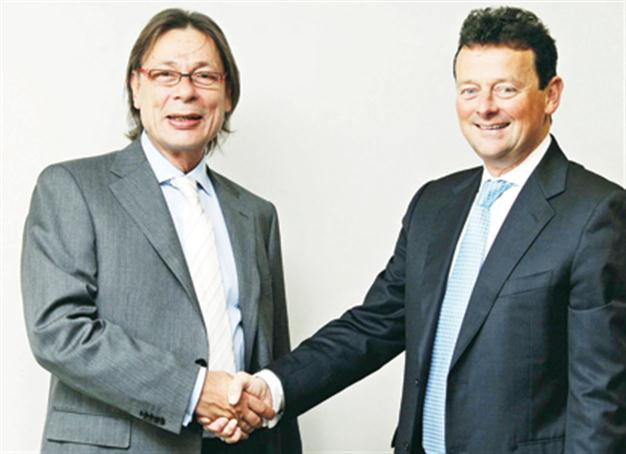Kurdish oil puts Turkish firm on London bourse
ALİ KAYALAR ISTANBUL - Hürriyet Daily News

Mehmet Sepil (L), head of Genel Energy, and Tony Hayward, former chief executive of BP pose after an October press meeting in London about the partnership between Genel and Hayward’s Vallares. The two companies have merged, executives say. Hürriyet photo
Turkey has made a move to be strongly involved in a disputed Iraqi oil business, with the first Turkish company to be listed on the top 100 index of the London bourse envisions soon increasing its production 10-fold from Iraq’s northern fields.
The attempt, orchestrated by the new Western partners of Genel Energy, seems like a plan broader than meeting Turkish demand, but a part of efforts to carry the rich Iraqi resource to Europe. Still, no short-term settlement of disputes between the central Iraqi government and the Kurdistan Regional Government (KRG) in the north is seen on the horizon, painting an obscure picture for investors. Energy security in Turkey – and in Europe – is another rising concern, which has already been vocalized by a top Turkish authority.
The merger process between Genel, the Turkish company owned by Mehmet Emin Karamehmet and Vallares, a fund founded by former BP chief executive Tony Hayward, British financier Nat Rothschild, banker Julian Metherell and investment manager Tom Daniel, has been finalized, Genel sources have told the Hürriyet Daily News.
The new-born Ankara-based Genel Energy Plc is scheduled to be listed on London’s FTSE 100 index today.
Big plans
The Western partners have raised $2.5 million in cash to date for the company whose total capital was pronounced at $5 billion.
The company will also become the third largest oil exploration and production company on the bourse.
Genel has already been operating on the Taq Taq and Takwe oil fields in northern Iraq. Even before the official finalization of the merger process, the parties cooperated in developing the Iraqi business as the company has been gradually increasing its production from 100,000 barrels per day (bpd) in February this year. Genel sources say the year-end target is 200,000 bpd. The company projects to produce 300,000 bpd by next year and 1 million bpd by the end of 2015.
Hayward, who was forced out of BP last year after a disaster that killed 11 rig workers and caused an environmental catastrophe, has already told the press that his company plans to spend $725 million to develop six fields in northern Iraq.
Genel also confirmed that it eyes to develop the existing oil pipeline that reaches Turkey’s Yumurtalık, connecting its field in Iraq.
Still, the lucrative business and promising plans may face local difficulties as the current technical services agreement, the sole existing consensus between the Kurdish administration and the central government, permits exploration but bans any sales. Arbil needs a broader product sharing agreement.
The Black Sea Energy and Economic Forum held in Istanbul also failed to resolve the Iraqi oil disputes, as authorities from both sides did not compromise on their current positions.
“Companies have no right to work in Iraqi territory without the approval of the Iraqi government. This position has been made very clear,” Iraq’s deputy prime minister for energy, Hussain al-Shahristani, told the Daily News on Nov. 17 on the sidelines of the Istanbul event.
In the ongoing row with Exxon Mobil over the international oil giant’s deal with Arbil, Baghdad earlier announced that it might disqualify Exxon and terminate its contracts in southern fields.
The only promising development made public came from Barham Salih, the head of the regional government. Iraq’s new oil investment law will be submitted to parliament by the end of this year, Salih said at a Nov. 13 meeting. Still, the calendar has not been approved by central Iraq authorities.
Such a deal is crucial for Turkey, both in terms of energy supply and security, as the country is highly concerned about the instability of its neighbors. Statements by Turkey’s Energy Minister Taner Yıldız back this up.
“Turkey expects the disputes between the northern Iraqi government and central government of Iraq to be resolved,” the minister told the Daily News during a Nov. 16 interview. Concerning Turkey’s terror problem, he said: “European countries should also understand the necessity of maintaining security in the region in order to transfer Iraqi gas and oil to European markets.”
















